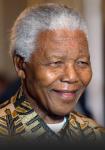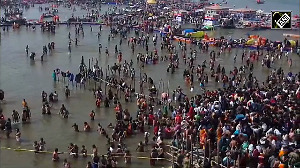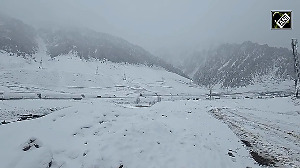He took over control of the island nation on December 4 from Prime Minister Laisenia Qarase, who incidentally had been appointed interim prime minister by Commodore Bainimarama himself, following an earlier coup in 2000.
Subsequently Qarase won two elections that gave him constitutional legitimacy as the head of a democratic government. The current coup is the fourth one in less than two decades.
The military commander's actions have drawn strong condemnation from the US, EU, Australia and New Zealand. The Indian reaction on the other hand has been rather muted, with an official spokesman saying India was saddened to learn about the turn of events in Fiji and hoped that the rule of law would prevail and power would be returned to the people at the earliest. The statement does not call for the reinstatement of the prime ninister and the army's return to the barracks.
The Indian reaction is probably guided by the fact that this is the first coup in the Pacific nation which is not directed against the ethnic Indians. In fact, Commodore Bainimarama has ostensibly staged the coup to restore racial harmony and to ensure that Indo-Fijians are not relegated to second class status.
The coup had been coming for a long time. A few days before the coup, the police had seized a consignment of ammunition meant for the military. The latter not only recovered the consignment but also demanded the resignation of the police chief, who happens to be an Australian national. The police chief was subsequently forced to proceed on leave.
In a series of slow moving events, the military went on to disarm the police and the personal bodyguards of the government ministers and finally seized power. The military and the government have been at loggerheads for over two years and Commodore Bainimarama had indicated his preferences clearly during the last elections.
However, despite his support to the opposition Labour Party led by former prime minister Mahendra Chaudhry, the ruling Soqosoqo ni Duavata ni Lewenivanua party of Prime Minister Qarase emerged victorious in the elections held in May this year. After the elections, unlike in the previous instance, the prime minister invited the opposition Labour Party to join the government. (Fiji's constitution mandates that all parties drawing more than 10 percent votes be included in the government, but this was given the go-by after the elections in 2001).
All seemed well till the prime minister revived the controversial Reconciliation, Tolerance and Unity Bill which was aimed at giving amnesty to the perpetrators of the 2000 coup. Bainimarama had demanded that the government drop this controversial legislation and quash two other land rights bills that unfairly favoured the majority indigenous Fijians over the ethnic Indian minority. In addition, he had demanded the removal of Fiji's police chief, who had threatened to charge Bainimarama with sedition for his comments about toppling the government.
Commodore Bainimarama had been accusing Prime Minster Qarase and his administration of following policies favouring indigenous Fijians at the expense of the ethnic Indian minority, which according to him were exacerbating racial tensions that threatened the country's stability. The military commander had also accused the government of being sympathetic to Fijian nationalist rebels who stormed parliament in 2000 and held the then-prime minister Mahendra Chaudhry and members of his cabinet hostage for 56 days.
The Commodore had also opposed a bill giving greater land rights to ethnic Fijians, who make up 51 percent of the estimated population; ethnic Indians make up 44 percent. While ethnic Indians constituted a majority in 1987, forced migration after the previous coups reduced their numbers.
The seeds of the current problem were sown during the tumultuous events of 2000 when a duly elected government led by Mahendra Chaudhry, leader of the Fiji Labour Party, was overthrown in an attempted coup by George Speight, a failed businessman, with the ostensible purpose of restoring native Fijian pride. In the aftermath of the coup the military assumed control and appointed Qarase as the interim prime minister; he was elected prime minister after the parliamentary elections held in 2001.
After the elections, the government with the prodding of the judiciary and the military had started a process of rapprochement between the native Fijians and Indo-Fijians. It took steps to reassure the Indo-Fijians about their role in the country. One of the most important steps in this direction was the penal action initiated against the perpetrators as well as the supporters of the 2000 coup. Many of these were highly placed in the government and included the vice-president and a few ministers.
In order to shield these highly placed functionaries, the government tried to introduce the controversial Reconciliation, Tolerance and Unity Bill, which had a provision to grant amnesty to the perpetrators and supporters of the coup. However, the military not only opposed the bill but also emerged as a promoter of racial harmony.
After vacillating initially, the armed forces came out strongly against the perpetrators of the coup and those involved were court-martialled. The armed forces also initiated steps to recruit Indo-Fijians, but their number continues to be insignificant. Bainimarama himself has been quite vocal in criticizing the government and had stated that there would not be any reconciliation in Fiji unless the people recognised that the events of 2000 were wrong.
After the coup, Bainimarama told a news conference he was forced by the circumstances to act and a caretaker government would be set up to oversee elections, without providing a date for the polls. He has not only declared emergency but has also assumed the powers of the president and removed Vice-President Ratu Joni Madraiwiwi from office. He has also sent Qarase to his native village in the Lau group of islands far to the east of Suva.
To complete his task as president, Commodore Bainimarama has sworn in Dr Jona Senilagakali, a military doctor, as prime minister, dissolved Parliament, replaced Driver as officiating head of police with a loyal colonel, and said he would resort to force if necessary. He has also warned Fijian ministers not to interfere in the process and appealed to the international community to 'first learn and understand the situation here in Fiji before taking action'.
Some of the tribal chiefs in Fiji and some Indo-Fijians have supported the coup. According to Ong Sing Beng, an economist at JP Morgan Chase & Co Singapore, the coup does not represent a 'power grab' by Bainimarama. He emphasized that the commander had installed an interim civilian government after putting down the 2000 coup, and would do so again in all probability.
It is too early to say what impact one more coup will have on this troubled country, but if Commodore Bainimarama sticks to his commitment to racial harmony, the coup may put an end to all future coups. In that context, it seems the Commodore has erred in so far as he has used the wrong means to attain the right ends.
The author is a New Delhi-based analyst






 © 2025
© 2025